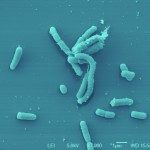Lien vers Pubmed [PMID] – 23402825
J. Infect. Dis. 2013 May;207(10):1535-43
BACKGROUND: Yersinia pestis (the plague bacillus) and its ancestor, Yersinia pseudotuberculosis (which causes self-limited bowel disease), encode putative homologues of the periplasmic lysozyme inhibitor Ivy and the membrane-bound lysozyme inhibitor MliC. The involvement of both inhibitors in virulence remains subject to debate.
METHODS: Mutants lacking ivy and/or mliC were generated. We evaluated the mutants’ ability to counter lysozyme, grow in serum, and/or counter leukocytes; to produce disease in wild-type, neutropenic, or lysozyme-deficient rodents; and to induce host inflammation.
RESULTS: MliC was not required for lysozyme resistance and the development of plague. Deletion of ivy decreased Y. pestis’ ability to counter lysozyme and polymorphonuclear neutrophils, but it did not affect the bacterium’s ability to grow in serum or resist macrophages. Y. pestis lacking Ivy had attenuated virulence, unless animals were neutropenic or lysozyme deficient. The Ivy mutant induced inflammation to a degree similar to that of the parental strain. Last, Y. pseudotuberculosis did not require Ivy to counter lysozyme and for virulence.
CONCLUSIONS: Ivy is required to counter lysozyme during infection, but its role as a virulence factor is species dependent. Our study also shows that a gene that is not necessary for the virulence of an ancestral bacterium may become essential in the emergence of a new pathogen.



